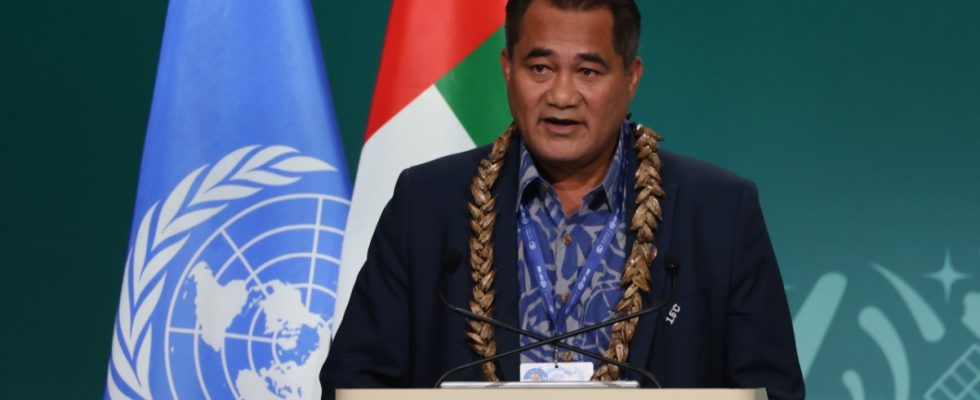Everything went like clockwork for Sultan al-Jaber. A perfectly organized climate conference, a tailor-made start, all discussions according to plan – and then this. With his proposal for the most important document of COP28, its president has now turned half the world against him. All schedules are perdu.
On Monday afternoon, al-Jaber presented how he envisions the “global inventory.” It should be the central result of the conference: the conclusion from eight years of inadequate climate policy. The inventory, in English global stocktake, is intended to show the states how things should run better in the next few years. Most countries are in favor of phasing out fossil fuels phase out.
But in al-Jaber’s suggestion there is not a word about it. Instead, the production and consumption of fossil fuels should be “reduced” with the aim of reaching net zero emissions sometime by the middle of the century. But that would mean that oil, gas and coal could continue to be mined if only the associated emissions were compensated for in some way. Or if the resulting climate-damaging carbon dioxide were captured and stored. So nothing would change much at first.
The response to al-Jaber’s suggestion came that evening: an outcry. “We will not sign our death warrant,” says the minister from Samoa, Cedric Schuster – he speaks for the group of small island states. “We cannot sign anything that does not contain strong commitments to phasing out fossil energy.” The alliance of the willing, the “High Ambition Coalition,” also meets that evening. Federal Foreign Minister Annalena Baerbock (Greens) is represented for Germany. She also expresses herself clearly. The paper is “a disappointment,” she says. “Essential elements are not acceptable to us as the EU.” Instead of giving companies clarity that they should forego any fossil investment, even the construction of new coal-fired power plants is possible with this proposal. The goal of limiting global warming to 1.5 degrees Celsius cannot be achieved in this way.
A strong counter-bloc with Saudi Arabia and India. Where does China stand? Not clear
At night, Baerbock will also present this at a meeting of the heads of delegations from all over the world. Various states join her, including Egypt and the USA in the form of their negotiator John Kerry. Europeans and island states are on this line anyway.
However, there is also a strong opposing bloc. This not only includes Saudi Arabia, which, like other oil countries, rejects any move away from fossil energy – and not just since the OPEC Secretary General called for resistance in a letter. India doesn’t think much of this either phase out – but especially with a view to coal, which it wants to continue to mine for a while. However, these countries are not speaking out openly.
It is also unclear where exactly China stands. The world’s largest emitter had already coordinated its line with the number two emitter, the USA, before the COP. your common “Sunnyland’s statement” but says little or nothing about the future of fossil energies. Instead, they advocate tripling the capacity of renewable energies by 2030 and doubling energy efficiency in the same period – both of which can also be found in al-Jaber’s proposal. When replacing coal, Oil and gas, on the other hand, are thin on paper, and observers fear that Beijing doesn’t want to go any further.
But the biggest mystery remains al-Jaber himself. On Sunday he boasted that he was negotiating the end of fossil fuels for the first time in the history of climate summits. It’s about keeping the 1.5 degrees Celsius within reach, as the Intergovernmental Panel on Climate Change demands. “Failure is not an option,” says al-Jaber. And just a few hours before he presented a completely different draft, negotiators were firmly expecting a text that contained at least two options that states could choose between. Who or what triggered al-Jaber’s change of heart remains unclear.
But as it is, the states that are leaving fossil fuels must now try to negotiate a stronger passage to end coal, oil and gas. What makes matters worse is that some of them are also on the defensive on another issue: a draft text for a new “global adaptation goal” that aims to help poor countries better adapt to the consequences of climate change envisages immense financial obligations. The Europeans fear that they will ultimately converge on the industrialized countries. So you are fighting on two fronts.
Days ago, al-Jaber had set the big goal of finally organizing a climate summit that would end on time. On time would mean: This Tuesday at eleven o’clock local time, in Germany it would be eight o’clock in the morning. He can forget about that. In any case, Annalena Baerbock’s announcement should sound like a threat to him: “We have time.”

